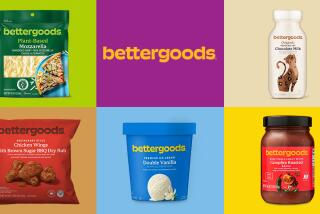Coke About to Dive Into a Juicy Market : Beverages: Fruitopia fruit drinks are entering a $6-billion industry that is currently dominated by Snapple.
Coca-Cola shook up the growing alternative-beverage industry Tuesday, introducing a new line of fruit drinks that is expected to accelerate the evolution of the soft drink giants into broader-based beverage companies.
The move also signals that the great minds and financial powers of the soft drink industry have finally begun to see the future as many consumers envision it--and it is not carbonated.
By April 1, Fruitopia--a non-carbonated fruit drink clearly designed to appeal to youth--will begin to appear on store shelves nationwide under the familiar banner of Minute Maid, a division of Atlanta-based Coca-Cola Co.
The action is a tardy but still intricately planned move by Coke to grab a stake in the estimated $6-billion alternative beverage industry dominated by Snapple. The category includes fruit drinks, teas, waters and sports drinks.
The beverages are typically lower in sugar and calories than conventional soft drinks, but often are not as âhealthyâ as many consumers perceive them to be, analysts say. The hip names given the drinks point to the youthful customers being pursued.
âItâs cosmic marketing,â said Larry Jabbonsky, editor of Beverage World, a Great Neck, N.Y.-based trade publication. Among the youth-oriented names that Coke has devised for its eight fruit-flavored drinks: Lemonade Love & Hope, Citrus Consciousness and The Grape Beyond.
Consumers have been turning away from carbonated soft drinks for several years, particularly in the diet cola segment. Last year, for the first time, cola sales accounted for less than half the $50-billion soft drink market.
With Tuesdayâs announcement of the introduction of Fruitopia, Coke expects to quickly grab a huge chunk of the market. With the aid of a $30-million ad campaign created by leading-edge Venice agency Chiat/Day, industry analysts say Coke seems to be on the right track.
âCoke is molting from a soft drink maker into a multifaceted beverage company,â said Jesse Myers, editor of Beverage Digest, a Stamford, Conn.-based trade publication. âWhile Coke is late in coming to the market, it probably wonât be long until they dominate.â
Coke executives say they expect to grab a 15% share of the alternative beverage market within the next year.
âWe are changing the definition of soft drinks to include beverages,â Sergio Zyman, Cokeâs global marketing chief, said at a news conference Tuesday in New York.
Coke and Pepsi both entered the iced tea market in 1992, linking up with Nestea and Lipton, respectively. Pepsi went a step further that year and entered a joint venture with Ocean Spray.
The latest move by Coke âonly affirms the direction we took when we saw the light a couple years ago,â said Brian Swette, senior vice president at Pepsico.
Until now, the undisputed leader in the alternative beverage field has been Snapple Beverage Co. In 1993, Snapple had a 22.9% market share in the category, compared to 12.9% for Coca-Cola and 11.7% for Pepsico, according to the Maxwell Consumer Report.
While Cokeâs announcement sent Snapple stock spinning down $1.75 per share to close Tuesday at $27.125 on Nasdaq, executives at the Valley Stream, N.Y-based firm expressed little concern.
âCoke and Pepsi made me a rich man two years ago when they went into the tea business,â said Leonard Marsh, president and chief executive of Snapple.
âThey helped expand the entire category, and my business has flourished ever since. Now theyâre going to do the same thing with fruit juice.â
But Marsh concedes that Snapple might have a particularly tough time competing with Coke and Pepsi in the global market. Coke and Pepsi have far superior international distribution systems.
âBut the difference between them and us is, I donât have to be No. 1 in the world,â Marsh said. âIâm just looking to build and grow my business, and they will help me by expanding the category.â
Coca-Cola slipped 25 cents Tuesday to $42.375, while Pepsico closed unchanged at $39.125 on the New York Stock Exchange.
More to Read
Inside the business of entertainment
The Wide Shot brings you news, analysis and insights on everything from streaming wars to production â and what it all means for the future.
You may occasionally receive promotional content from the Los Angeles Times.










